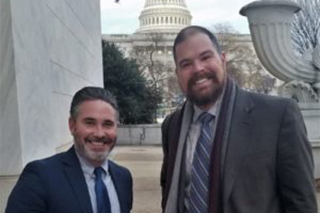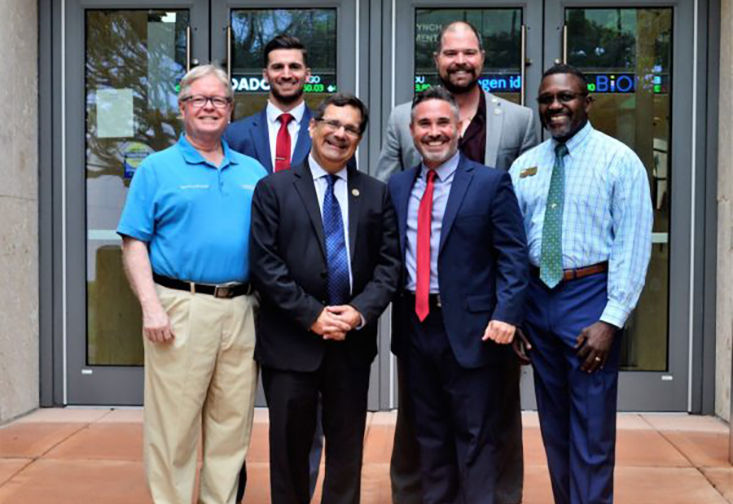On Saturday, May 26, the USF St. Petersburg Military and Veterans Success Center and Open Partnership Education Network (OPEN) officially held the kick-off for the Veterans Transition Task Force, a nationwide initiative established by U.S. Congressman Gus Bilirakis. Joined by Rep. Bilirakis, who represents Florida’s 12th Congressional District and is Vice-Chairman of the Veterans’ Affairs Committee, five local veterans shared their stories of transition from military to civilian life at Lynn Pippenger Hall on the USF St. Petersburg campus at 6 p.m.
The galvanizing event “Becoming Civilian: A Warrior’s Perspective,” is the first in a year-long series established by the task force to promote ongoing dialogue, education for civilians and military service members and research around the veteran transition phenomenon. The current task force is made up of a small team of eight nationally recognized leaders in veteran transition based out of Tampa Bay.
“These veterans have extremely compelling stories to tell us of transitioning out of the military and into civilian life,” said Ben Smet, U.S. Navy veteran, grant writer for USFSP’s Military & Veterans Success Center and co-chair of the task force. “Some stories are really positive and exciting, others are truly heart wrenching.”
In April 2017, the Institute of Museum and Library Services (IMLA) and Community Salute released a report on the American veteran. The study noted that though there are 22 million veterans across the country, they often go unnoticed by civilians. The report referred to a 2011 Pew Research Center study that found a staggering 71 percent of American civilians do not understand the problems and challenges service members, veterans and military families face.
“The general consensus military service men and women express when they are getting ready to transition into civilian life is that it is the scariest mission they have ever faced,” Smet said.
Last year, Rep. Bilirakis asked Smet and Brian Anderson, a U.S. Army Green Beret veteran, to spearhead the task force.
“Improving the [veteran] transition process has been a huge priority for me,” said Rep. Bilirakis.
“The congressman saw that Brian and Ben were both dedicated to finding solutions for veterans’ transition issues and immediately tapped them to head the task force,” said Mike Ciminna, District Director for Rep. Bilirakis and a U.S. Marine Corps veteran.
Smet, currently a USF doctoral student, has dedicated his academic career to researching the transition phenomenon that veterans face. He said that studies pertaining to the psycho-social aspect of transitioning to civilian life are scarce and an emerging field of research. One of the most comprehensive studies on this phenomenon, “The State of the American Veteran,” shows an overwhelming trend from veterans surveyed.
“They found that three-quarters of the participating veterans – regardless of any demographic – have difficulties adjusting to civilian life,” Smet said.
Anderson is founder and CEO of the Veterans Alternative, an organization that provides alternative approaches to improve the quality of life for the military and veteran population. He worked closely with Rep. Bilirakis on the Creating Options for Veterans’ Expedited Recovery (COVER) Act, sponsored by the congressman and signed into law in July 2015.
The COVER Act ensures veterans can seek best treatment options that may be outside the traditional Veterans Affairs (VA) system, which primarily focuses on two methods of treating post-traumatic stress in veterans: Trauma-focused psychotherapies and medication, with no provisions for treatment pertaining to transition anxiety and stress.
“We need to be able to look at transition holistically,” Smet said. “With this Act, the VA is now commissioned to help veterans pursue alternative and individualized treatment through partnerships and collaboration.”

From left: Ben Smet, Hero and Brian Anderson in Washington D.C. Photo courtesy of Ben Smet.
Ciminna said that many of Smet and Anderson’s ideas were also included in the Transition Improvement Act, which once passed, will establish individualized transition counseling pathways, a pilot and grant program for community providers and innovative services to help veterans during the challenging process of transition. Smet and Ciminna both said that not all military members suffer from post-traumatic stress, but many veterans face transition stress and anxiety that affects their ability to successfully make the transition from active duty to civilian life.
Research and evidence from veterans who have pursued treatment beyond the VA have gleaned extraordinary results. Examples of successful alternative treatments include equine therapy, service dogs, yoga therapy and Accelerated Resolution Therapy (ART).
Based on personal experience and success, Anderson is a huge proponent for ART, a form of psychotherapy that works to directly reprogram the way distressing images and memories are stored in the brain, so they do not trigger strong physical or emotional reactions.
ART was developed in 2008 by Laney Rozenzweig, under the direction of Dr. Kevin Kip – who is a member of the task force and Distinguished Professor at the USF College of Public Health. In November 2015, ART was federally recognized as an “effective” evidence-based treatment for psychological trauma and depression and has successfully proven to help veterans suffering from post-traumatic stress.
Ciminna said that it makes sense for the task force to have its home base in the Tampa Bay area because of the growing number of veterans transitioning here and the multitude of local organizations focused on veteran support integrating into civilian life.
Smet and Anderson hope to grow the task force through galvanizing events in the region and an open online forum to address the transition phenomenon.
“Our goal is to find solutions through the task force that will lead to legislation, so we can help veterans transition into their civilian roles in a peaceful way and better equip them to feel like productive citizens,” said Smet.
To learn more about the Veterans Transition Task Force, email Ben Smet: bas1@mail.usf.edu
Article written by Karlynd June, USFSP Content Specialist
